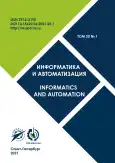Method for Protection of Copyright on Vector Data
- Authors: Vybornova Y.D1, Sergeev V.V1
-
Affiliations:
- Самарский университет
- Issue: Vol 20, No 1 (2021)
- Pages: 181-212
- Section: Digital information telecommunication technologies
- URL: https://journal-vniispk.ru/2713-3192/article/view/266302
- DOI: https://doi.org/10.15622/ia.2021.20.1.7
- ID: 266302
Cite item
Full Text
Abstract
The paper proposes a method of copyright protection for vector maps, based on the embedding of raster digital watermarks. The method combines original ideas, namely, a vector data watermarking approach that does not distort the coordinate information of vector objects and embedding of noise-like images that encode a binary sequence. The use of noise-like carrier allows to simplify the verification procedure, and also to ensure the resistance of the hidden bit sequence to distortions, including interpolation errors. In comparison with previous investigations made by the authors when solving problems of vector data protection, the robustness of the embedded noise-like digital watermarks has been significantly increased by developing a new algorithm for detection of the binary sequence hidden in the spectrum of a noise-like image. The purpose of the experimental studies was to assess the attainable probability of correct sequence extraction for various parameters and embedding conditions. The study of information capacity showed that the potential amount of information embedded in each polygon without distorting the watermark sequence depends on the type of a map, namely on the number of vertices that make up each polygon. An experimental study on robustness against potentially possible transformations aimed at maliciously deleting the digital watermark from the vector map is performed. The developed method demonstrates resistance to affine transformations, cropping, addition, removal and reordering of vertices / objects, and, thus, seems to be the optimal solution to the problem of copyright protection for vector data. The analysis of the method quality according to the criteria of accuracy, durability, information capacity, and computational complexity is performed. The results of all conducted studies confirm the efficiency and the effectiveness of the proposed method for vector map protection, as well as its distinct advantage over the prior art.
About the authors
Y. D Vybornova
Самарский университет
Email: vybornovamail@gmail.com
V. V Sergeev
Email: vserg@geosamara.ru
References
- Abubahia A., Cocea M. Advancements in GIS map copyright protection schemes – a critical review // Multimedia Tools and Applications. 2017. vol. 76. no. 10. pp. 12205–12231.
- Peng Y., Yue M. A Zero-Watermarking Scheme for Vector Map Based on Feature Vertex Distance Ratio // Journal of Electrical and Computer Engineering. 2015. vol. 2015. pp. 1–6.
- Li A., Lin B.-X., Chen Y.A. Study on copyright authentication of GIS vector data based on Zero-watermarking // The International Archives of the Photogrammetry, Remote Sensing and Spatial Information Sciences. 2008. vol. 37(B4). pp. 1783–1786.
- Ren N., Wang Q., Zhu C. Selective authentication algorithm based on semi-fragile watermarking for vector geographical data // 22nd International Conference on Geoinformatics. 2014. vol. 1. pp. 1–6.
- Da Q. et al. A Novel Hybrid Information Security Scheme for 2D Vector Map // Mobile Networks and Applications. 2018. vol.1. pp. 1–9.
- Wang N., Bian J., Zhang H. RST Invariant Fragile Watermarking for 2D Vector Map Authentication // International Journal of Multimedia and Ubiquitous Engineering. 2015. vol. 10. no. 4. pp. 155–172.
- Kim J. Robust Vector Digital Watermarking Using Angles and a Random Table // Advances in Information Sciences and Service Sciences. 2010. vol. 2. no.4.
- Lee S.H., Kwon K.R. Vector watermarking scheme for GIS vector map management // Multimedia Tools and Applications. 2013. vol. 63. no. 3. pp. 757–790.
- Peng Z., Yue M., Wu X., Peng Y. Blind watermarking scheme for polylines in vector geo-spatial data // Multimedia Tools and Applications. 2015. vol. 74. pp. 11721–11739.
- Wang Y., Yang C., Zhu C. A multiple watermarking algorithm for vector geographic data based on coordinate mapping and domain subdivision // Multimedia Tools and Applications. 2017. pp. 1–19.
- Voigt M., Busch C. Watermarking 2D-vector data for geographical information systems // Proceedings of the SPIE, security and watermarking of multimedia content. 2002. vol. 4675. pp. 621–628.
- Ohbuchi R., Ueda H., Endoh S. Robust Watermarking of Vector Digital Maps // Proceedings of IEEE International Conference on Multimedia and Expo. 2002. vol. 1. pp. 577–580.
- Peng Y., Lan H., Yue M., Xue Y. Multipurpose watermarking for vector map protection and authentication // Multimedia Tools and Applications. 2017. vol. 77. no.1. pp. 1–21.
- Peng F., Yan Z.J., Long M. A Reversible Watermarking for 2D Vector Map Based on Triple Differences Expansion and Reversible Contrast Mapping // LNCS. 2017. vol. 10658. pp. 147–158.
- Wang N., Zhao X., Xie C. RST Invariant Reversible Watermarking for 2D Vector Map // International Journal of Multimedia and Ubiquitous Engineering. 2016. vol. 11. no. 2. pp. 265–276.
- Cao L., Men C., Li X. Iterative Embedding-Based Reversible watermarking for 2d-Vector Maps // Proceedings of 17th IEEE International Conference on Image Processing (ICIP). 2010. vol. 1. pp. 3685–3688.
- Wang N., Men C. Reversible Watermarking for 2-D Vector Map Authentication with Localization // Computer Aided Design Journal. 2012. vol. 44. no. 4. pp. 230–330.
- Выборнова Ю.Д., Сергеев В.В. Метод защиты векторных карт с использованием изображения ЦВЗ как вторичного контейнера // Компьютерная оптика. 2019. Т. 43. № 3. С. 474–483.
- Глумов Н.И., Митекин В.А. Алгоритм поблочного встраивания стойких ЦВЗ в крупноформатные изображения // Компьютерная оптика. 2011. Т. 35. № 3. С. 368–372.
- Vybornova Y.D. Application of spatial interpolation methods for restoration of partially defined images // CEUR Workshop Proceedings. 2018. vol. 2210. pp. 89–95.
- Выборнова Ю.Д., Сергеев В.В. Новый метод встраивания цифровых водяных знаков в векторные картографические данные // Компьютерная оптика. 2017. Т. 41. № 6. С. 913–919.
Supplementary files









